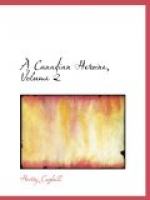Lucia started, and her heart seemed to give a great leap—could he mean that the prisoner was innocent? A week ago she would have said that the burden of disgrace lay upon them too heavily to be much increased by anything that could happen, and now she knew by the wild throb of hope how its weight had been doubled and trebled since the shadow of murder had been hanging over them. But the hope died out at once, for there was nothing in her mind to feed it, and she had sunk back into her enforced quiet before she answered,
“Will you tell me what the evidence is, if you have heard at all exactly, and what you have seen to-day?”
There was nothing of girlish excitement or agitation in her words or tone. Mr. Strafford wondered a little, but at once did as she asked.
“The evidence appears to be very simple and straightforward. From the way in which the crime was committed and the body found, there is no reason to suppose that it had been planned beforehand. The mode in which death was inflicted showed, on the other hand, that it was not the result of a hasty or chance blow—but really a murder, though unpremeditated. Quite near to the place where the body lay, a man was found hidden among the bushes. His hands and clothes were marked with blood; he had by him a hatchet which had all the appearance of having been used to inflict the wounds on the murdered man, and a heavy stick which might well have given the first blow. His being but clumsily hidden is accounted for easily, for he was evidently intoxicated; and lastly, he is known to have been connected with a party of smugglers who used to land their goods on Beaver Creek, and who had reason to dislike Doctor Morton.”
A deeper breath, a slight relaxing of the closed lips, were the only signs from either mother or daughter how this brief and clear account, riveting as it did upon their minds the certainty of guilt, had been endured as people endure the necessary torture of the surgeon’s knife. Neither spoke, but waited for what was to follow.
Mr. Strafford’s tone changed. “I have told you what you will have to hear from others,” he said; “and, without doubt a stronger case would be difficult to find. Unless something new should come to light, I do not think many people will even feel the least uncertainty on the subject. But I do.”
He paused, and then went on; not, however, without keeping an anxious watch on the faces opposite to him, lest his touch, however gentle, should press too hardly upon their quivering nerves.
“In the first place it appears that there is a man on whom, if this prisoner could be cleared, suspicion would naturally fall. This man, Clarkson, I dare say you know by repute far better than I do, who never heard of him till to-day; but he appears to have so bad a character that no one would be shocked or surprised to hear that he was the murderer. He had also a much stronger ill-will against Doctor Morton than any one else, either Indian or white man, can be shown to have had. But yet there is such an entire absence of any proof whatever that he did commit the crime, that unless I wanted you to understand all my reasons for uncertainty, I would not speak of him even here in connection with it.




